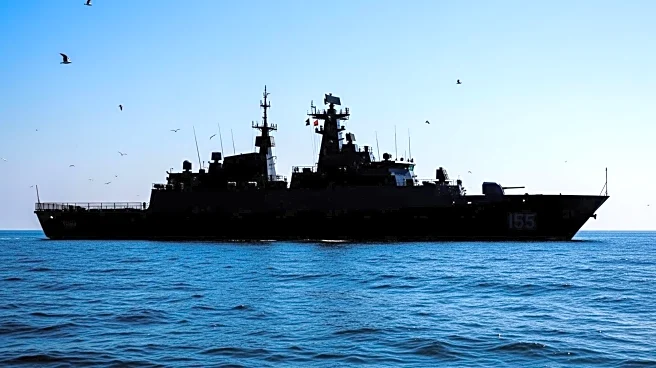What is the story about?
What's Happening?
The Indian Navy is set to commission INS Androth, the second Anti-Submarine Warfare Shallow Water Craft (ASW-SWC), at a ceremonial event at the Naval Dockyard in Visakhapatnam. This commissioning marks a significant milestone in the Navy's efforts to enhance its capabilities and indigenization. Built by Garden Reach Shipbuilders and Engineers (GRSE) in Kolkata, INS Androth boasts over 80 percent indigenous content, underscoring India's commitment to self-reliance in maritime defense. The ship is part of a broader initiative that has seen several advanced warships join the naval fleet recently, including Arnala, Nistar, Udaygiri, and Nilgiri. Vice Admiral Rajesh Pendharkar, Flag Officer Commanding-in-Chief of the Eastern Naval Command, will preside over the ceremony.
Why It's Important?
The commissioning of INS Androth is a testament to India's growing maritime self-reliance and its strategic focus on indigenization. By enhancing its anti-submarine warfare capabilities, the Indian Navy is better equipped to counter threats in littoral waters, thereby strengthening national security. This development is crucial for India's defense industry, as it highlights the role of domestic shipyards and industries in advancing military technology. The emphasis on indigenous content aligns with the 'Atma Nirbharta' initiative, promoting self-sufficiency and innovation within the country's defense sector. The induction of such vessels not only boosts the Navy's operational capabilities but also supports the local economy by fostering technological advancements and job creation.
What's Next?
Following the commissioning of INS Androth, the Indian Navy is expected to continue its focus on expanding and modernizing its fleet with indigenous vessels. This strategy will likely involve further collaborations with domestic shipbuilders and increased investment in research and development to enhance technological capabilities. The Navy's ongoing efforts to indigenize its fleet may prompt other sectors within the defense industry to adopt similar approaches, potentially leading to a broader shift towards self-reliance in India's defense procurement policies. Additionally, the successful commissioning of INS Androth may encourage further government support and funding for indigenous defense projects.
Beyond the Headlines
The commissioning of INS Androth reflects a broader cultural and strategic shift towards self-reliance in India's defense sector. This move not only enhances national security but also fosters a sense of national pride and technological prowess. The emphasis on indigenous content and innovation may inspire other industries to pursue similar paths, potentially leading to a more self-sufficient and resilient economy. Furthermore, the success of such initiatives could strengthen India's position as a regional power, capable of defending its interests and contributing to global maritime security.














